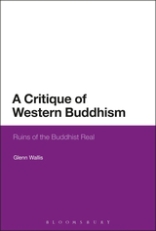Book
A Critique of Western Buddhism: Ruins of the Buddhist Real
Open Access
Bloomsbury Academic
ABOUT:
What are we to make of Western Buddhism? Glenn Wallis argues that in aligning their tradition with
the contemporary self-help industry, Western Buddhists evade the consequences of Buddhist thought. This book shows that with concepts such as vanishing, nihility, extinction, contingency, and
no-self, Buddhism, like all potent systems of thought, articulates a notion of the “real.” Raw, unflinching acceptance of this real is held by Buddhism to be at the very core of human “awakening.”
Yet these preeminent human truths are universally shored up against in contemporary Buddhist practice, which contravenes the very heart of Buddhism.
The author's critique of Western Buddhism is threefold. It is immanent, in emerging out of Buddhist thought but taking it beyond
what it itself publicly concedes; negative, in employing the “democratizing” deconstructive methods of François Laruelle's non-philosophy; and re-descriptive, in applying Laruelle's concept of
philofiction. Through applying resources of Continental philosophy to Western Buddhism, A Critique of Western Buddhism suggests a possible practice for our time, an "anthropotechnic", or religion transposed from its seductive, but misguiding, idealist
haven.
CONTENTS
Preface
Acknowledgements
PART ONE
Introduction: Raise the Curtain on the Theater of Western Buddhism!
Why Western Buddhism?
Theaters Comforting, Theaters Cruel
1. The Snares of Wisdom
Wisdom
Wellbeing
Neoliberal Subjects are Us, Wise and Well
2. Specters of the Real
The Rhetorical Unconscious
The Principle of Sufficient Buddhism
3. First Names of the Buddhist Real
First Names
Self-void (anātman)
Suffering-desire (dukkha-taṇhā)
Nihility (śūnyatā)
PART TWO
4. Non-Buddhism
Preface
François Laruelle and Non-Philosophy
A Science of Buddhism
Decision
5. Immanent Practice
The Great Feast of Knowledge
Thinking from the Real-One
Interlude: The Immanence of an Actual Suffering
Radical Immanence
Axiomatic Real
PART THREE
6. Buddhofiction
The Deliverance of Fiction
A Buddhism without a Past
7. Meditation in Ruin
Bibliography
REVIEWS
The single most important book of contemporary Buddhist philosophic reflection. Wallis' critique masterfully addresses the twinned questions central to contemporary Buddhism: `What use is being made of Buddhism today?' and `What use is Buddhism today?'—Richard K. Payne, Yehan Numata Professor of Japanese Buddhist Studies, Institute of Buddhist Studies, USA
It is a very rare and precious thing to find a book such as this, which engages as deeply with religious materials as it does with the philosophical. Glenn Wallis brings together resources from Continental philosophy, namely Francois Laruelle's non-philosophy, and concepts and ideas from Buddhism to carry out a A fecund project that grows in the ruins of our philosophical and religious pretensions and arrogance." —Anthony Paul Smith, Associate Professor of Philosophical Theology, La Salle University, USA
Glenn Wallis' Critique of Western Budism is one of the rare examples of non-philosophy applied on a specific subject area, next to Anthony Paul Smith's non-philosophical environmental studies, John O'Maoilearca's animal studies as well non-Marxism. It proves that non-philosophy is praxis grounded rather than being self-sufficient system of philosophical diagnostics. Wallis' brilliant analysis demonstrates that radicalized Buddhism establishes a perfect homology with non-philosophy, both in form and in substance. —Katerina Kolozova, Professor of Philosophy and Gender Studies, University American College, Macedonia
Wallis' Critique is a bold commentary and analysis of Western Buddhism that runs against the mainstream. His central arguments are convincing and should certainly enter into discussions of "mindfulness" practices and adaptions of Buddhism in Western societies. This book will challenge the thinking and practice of many readers, make some uncomfortable, but will be a life preserver for others. —Stuart W Smithers, Chair of the Department of Religious Studies, University of Puget Sound, USA
Buddhist Studies Review: A Critique of Western Buddhism: Ruins of the Buddhist Real, reviewed by Jonathon Gold (Princeton University)

